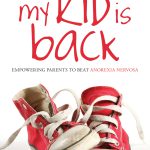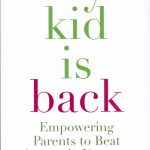Getting your kid back
Getting your kid back

My Kid is Back - this book means a lot to me because my parents did not see their kid come back - I wish they had been able to access the Maudsley Approach.
“… families talk about getting their kids back.” Professor Susan Sawyer, director of adolescent health at the Royal Children’s Hospital, Melbourne, is talking about the RCH’s highly successful implementation of the Maudsley Approach for early intervention of anorexia nervosa in children and adolescents.
It’s great to see the mainstream media picking up on the reality of eating disorders and running stories that are helping to raise awareness of the best available treatment options. Congratulations to Jill Stark for balanced reporting in Family ties helping teenagers rise above anorexia in Sunday Age (January 22). Information provided in this article will help save lives and families. This is a much-needed positive story, no misleading skeletal images. A well-told, non-sensationalist article of hope about Family Based Treatment (also known as the Maudsley Approach) for children and adolescents who develop anorexia nervosa. I’m particularly happy because one of the mothers interviewed, Belinda Caldwell, is on our organising committee for the inaugural eating disorder conference for families in Australia, May 2013.

My Kid is Back - 10 families share their experience of the Maudsley Approach and Professor Daniel Le Grange explains how the treatment works (this is the Australian and NZ book cover).
It is crazy that an illness first noted by an observant physician Richard Morton almost 400 years ago continues to be considered a ‘choice’ by many in our society. Part of the problem is the cultural fixation on slimness. Prior to that, the cultural fixation was religion. Both have hampered efforts to have this illness respected for what it is – the most deadly of all psychiatric illnesses.
I look forward to more informative articles on eating disorders – which are an enormous issue not only for children but for many adults (often high achieving professionals) who missed out on that vital early intervention and, if they have survived, are living only part-lives, in both careers and relationships, an ongoing prisoner of the illness.
By far the most desirable approach is to nip it in the bud with early intervention – and the best evidence based treatment available right now is FBT – the Maudsley Approach. One parent on FB today: 97 % success rate in 6 months v 7 years of torture, sounds too good to be true but well worth investigating. Indeed it is – without delay.
Early intervention is crucial in achieving the best possible outcome – total recovery. For more about ‘getting kids back’, see My Kid is Back .





